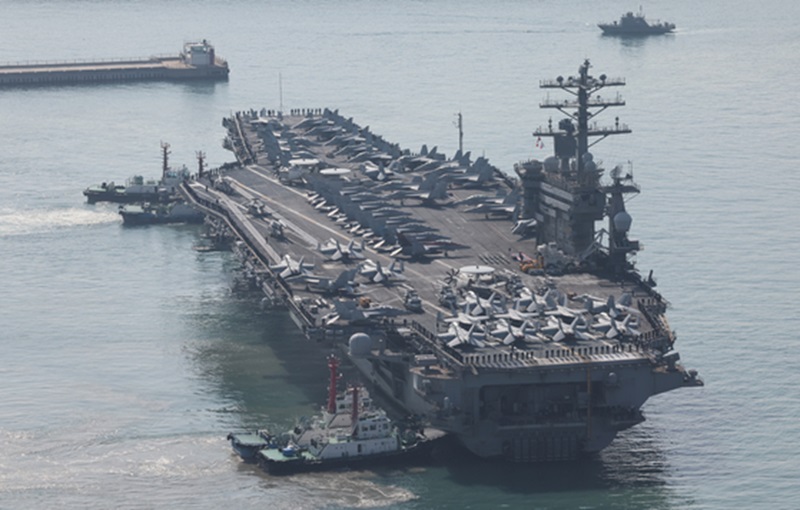One of the Chinese students under investigation for illegally filming a U.S. aircraft carrier near the Busan Korea Fleet Command on June 25 was previously recognized as a model Communist Party member, South Korean intelligence authorities revealed on Sunday.
Based on this, investigative authorities are looking into the possibility of Chinese intelligence agency involvement in the case.
According to South Korean intelligence authorities, a joint investigation team consisting of police, the Armed Forces Counterintelligence Command and the National Intelligence Service have concluded that the three Chinese students who were charged with illegally filming the American nuclear-powered aircraft carrier USS Theodore Roosevelt acted in an organized manner under the direction of a Chinese intelligence agency.
The three Chinese students are accused of illegally filming the USS Theodore Roosevelt using a drone on June 25. If it is revealed that the incident was a planned crime under the direction of a Chinese intelligence agency, the investigative authorities believe that in addition to the charge of violating the Military Base and Facility Protection Act applied at the time of filing the case, additional charges of treason can be filed.

The reason for focusing on whether the treason charges are applied is that one of the three Chinese students indicted was active as a Communist Party member, even receiving an “excellent Communist Party member” recognition at a Chinese university in May 2021.
Additionally, the results of the mobile phone forensics used by the students revealed a large number of contact information for Chinese public security officials and Chinese Communist Party newsletters.
The South Korean intelligence authorities presume that the students have been collecting information on South Korean military bases, major equipment, and American aircraft carriers for an extensive period and were reporting their findings back to China.
During the actual investigation into the Chinese students, hundreds of photos of South Korean and American military facilities that were taken by the students were discovered.
The investigative authorities reported that the students had conducted a preliminary survey of the Busan Korea Fleet Command in September 2022, where observation was relatively easy, and also filmed the American nuclear-powered submarine USS Springfield and the aircraft carrier USS Nimitz that entered port between February and March last year.
The investigative authorities are not ruling out the possibility that those who were selected as excellent communist party members for their intelligence-gathering skills were deliberately dispatched to South Korea.
The Chinese students were caught in June thanks to the active response of soldiers who were deployed to protect the president during an event. At the time, an army soldier conducting a security operation ahead of President Yoon Suk Yeol’s plan to board the USS Theodore Roosevelt reported a drone in the sky near the event venue, and the military and police launched a joint operation to catch the three Chinese individuals.
The alleged crime was discovered just before the event, so Yoon’s movements onboard the USS Theodore Roosevelt were not filmed. However, the investigative authorities reported that the classified presidential security plan may have been leaked, and in July, the authorities also launched an investigation into the alleged violation of the Military Secrets Protection Act.
“We persistently pursued the case that could have easily ended as a minor crime, and it led to a full-scale investigation,” a military official said regarding the case. “We are keeping a close eye on people involved in intelligence activities from countries such as China.”
Within the military, voices are calling for improvement in the legal response system for espionage by foreigners in South Korea in the wake of this accident. The current espionage law limits punishments to acts for North Korea, which is considered an “enemy country.”
It is currently impossible to apply espionage charges to foreigners, so relatively light punishments are inevitable. Espionage can be punished by imprisonment for more than seven years or the death penalty, while general treason can be punished by imprisonment for more than three years or life.
The National Assembly Legislation and Judiciary Committee Bill Review Subcommittee passed a revision bill on Oct. 13 that added “foreign countries or organizations similar thereto” to the scope of application of the espionage crime under Article 98 of the Criminal Act, which had previously been limited to “enemy countries.”
“For the sake of national interest, we must be alert to espionage activities not only from North Korea but also from foreign countries,” said an intelligence official. “I hope the revision bill to the espionage crime passes the National Assembly plenary session without any drawbacks.”
BY LEE KEUN-PYUNG, LEE YOO-JUNG, LIM JEONG-WON [lim.jeongwon@joongang.co.kr]





